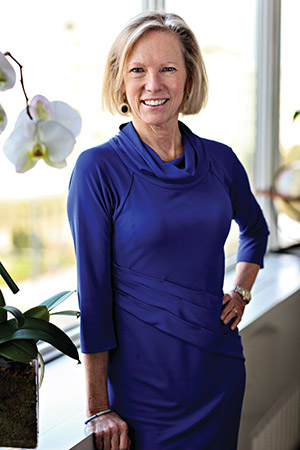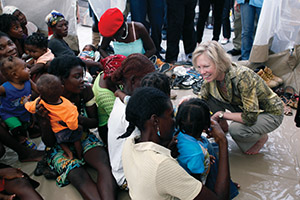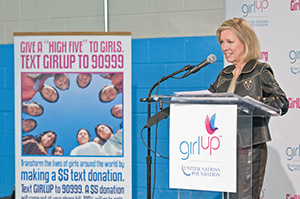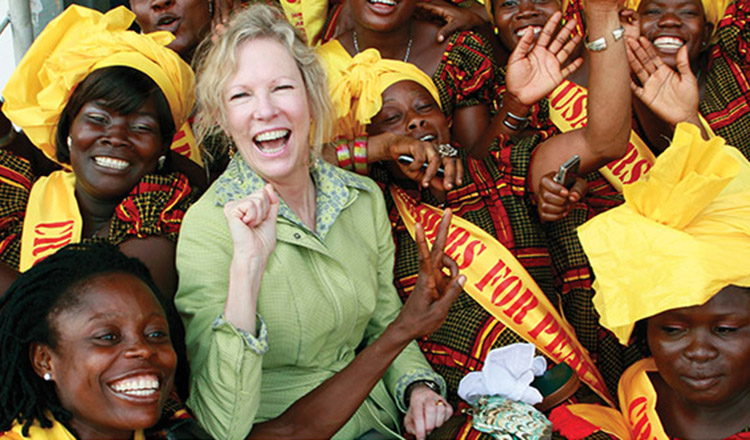Alumna improves the lives of women across the world at UN
Kathy Calvin would like to ride the Dragon.
As soon as she hears that she’s talking with an interviewer in East Tennessee, she asks about the 25-mile stretch of US 129. There is absolute joy in her voice as she considers the possibility of the ride, a series of switchback curves through sections of mountains so high that looking out over the edge is reminiscent of the view from a window seat in an airplane.
She goes with her husband, whenever her busy schedule permits, and the exhilaration of motorcycle riding, the freedom and the risk, suits her. She has made every move of her career — a career that has spanned government, private industry, and nonprofits with stops on Capitol Hill, at U.S.News & World Report, at AOL Time Warner, and finally at the United Nations Foundation — with the same enthusiasm. There is no problem too big, no curve too wide. She sets her course. She rides to the finish, every time.
It’s that ability to see the big picture and hang tight during the tough times that has kept her in such demand. Now serving as president and chief executive officer of the United Nations Foundation, Calvin (LA’71) brings her focus to issues that affect women and children the world over: Global poverty. Childhood vaccinations. The empowerment of women in developing countries. Energy and climate change.
Her job is to support the important work of the United Nations by coming up with the funding, the awareness, and the partnerships necessary to bring about global change on a grand scale.
“We started as a grant-making entity,” Calvin says. “But now we’re carrying out that work by doing problem-solving and global advocacy. We’re shifting from charity to change. Who do we need to join us to get these things done? We are making the UN Foundation a platform for all kinds of people.”
While solving these kinds of big issues can be a daunting endeavor, it’s one Calvin relishes because she honestly views all of them as doable. Change happens, she says, when you get enough people in a room who care, and then you empower them to run with the plans they create.
And where did she learn that? That’s easy, she says. Purdue University.
Ch-ch-changes
A child of the Midwest, who grew up in Ft. Wayne, and later in Dayton, Ohio, Calvin’s course was set for Purdue almost from the beginning. Her father, a World War II Navy recruit, wanted to attend the school, but the US government sent him to the Illinois Institute of Technology instead. A native of Indianapolis, his love for the Boilermakers spilled over into his family life, and ultimately guaranteed that both his daughter and his son would go to Purdue.
Calvin attended during what she calls a seminal time in the nation’s history, from 1967–1971.
“It was during the hotbed of the three big revolutions of our time,” she says. “Civil rights, women’s rights, and the anti-war movement. I became very involved in the anti-war movement. I thought the campus encouraged people to speak out. It was a school where you could find communities almost everywhere you looked.”
Living in the Kappa Kappa Gamma house, Calvin continued to get involved in causes and activities all over campus. She loved the chance to talk with people from all walks of life and get their input and ideas about the issues of the time. She worked on The Exponent, the student newspaper, and joined the Block P group. She served as campaign manager for a fellow student who ran for student body president.

The only thing that didn’t fit was her audiology and speech pathology major, which she says taught her an important fact about her personality. “I needed to be in an environment where the feedback system and rewards were more immediate,” Calvin says. “The thing about speech therapy is it’s a long process.”
Hoping to see more of the world, she graduated a semester early, trained as a paralegal and took a job in California for a while. She never participated in graduation ceremonies at Purdue. As of press time, she was scheduled to finally remedy that. In May 2013, she was to return to Purdue to receive an honorary doctorate of social sciences, and finally, walk the line.
Holding everything together
After a year in Los Angeles, Calvin followed a boyfriend to Washington, DC, where he was to working for a congressman from California. She worked as a researcher for four years, and then began a longtime Washington, DC- based career.
Billy Shore, founder and CEO of Share Our Strength, a nonprofit organization focused on ending childhood hunger in the US, first met Calvin in the late 1970s, by which time she was working in Senator Gary Hart’s office doing public relations and legislative coordination. She had no previous experience in the field, but Shore said that made no difference whatsoever. Hart made Calvin, a natural people person and leader, his press secretary, a position she kept as the senator sought the Democratic nomination for president in 1984.
Shore says that period, from the late ’70s to the mid-1980s, showed him of what Calvin was capable in a way that would forge a lifelong friendship between them. She was one of the first people he asked to join the board of Share Our Strength in 1984.
“At the time, the US was facing an energy crisis and there were just lots of issues,” Shore says. “I think of times where she would call people together and bring in a leader in a policy field or kind of an inspirational speaker, and it kept us going. She was great at sharing what she was learning. She shares it and she uses it to empower others.”
Without realizing it, she was empowering her entire gender, simply by succeeding at her work. She was one of only two female press secretaries during the 1984 presidential campaign. They were the first in any national campaign.
When she left politics, it was to make the switch to journalism, at U.S.News & World Report. Brought in by a new owner to help modernize the magazine, she helped shaped the publication into the household name it has now become — helping implement the “News You Can Use,” angle that was trademarked for U.S.News at the time and is still regularly used by Gannett and other large news media, creating its magazine’s first ever website, and seeking out the information consumers would one day come to count on it for, the famous lists of colleges and rankings.
Susan Riker, director of corporate and foundation relations at HelpAge USA, met Calvin there and worked with her for most of her tenure. She recalls that her mentor revolutionized not only the way the magazine worked, but also how it treated its employees.

“She ended up being the glue that held everything together,” Riker says. “She had a huge impact on HR at U.S.News. She put into place the adoption stipend, because she felt it was so important for others. She put the family leave program in place. She helped build our community service project with the school next door where we would go over and tutor kids on our lunch breaks.”
Calvin, Riker says, has an innate ability to not only get the job done, but to genuinely care for those doing it.
“There’s a special mixture there of extraordinary professional grace and abilities, and a warm, kind person who understands the bigger picture of what people need. She was hugely responsible for the professional growth of women at U.S.News.”
Working for women
Calvin left U.S.News in the mid 1990s, when AOL came calling. She joined Steve Case’s team in 1997 as chief communications officer, right before the Internet exploded into homes across the country and the world. The company’s stock was hovering at around $4 a share. In two years time, it would be $100.
She can remember the exact moment when she realized that AOL and the World Wide Web had become something much bigger than an unproven ground where computer guys came to chat.
“The service shut down for about eighteen hours once,” Calvin says. “The new users were coming online faster than our ability to upgrade the technology. And that was when we realized we had created not just a toy but also a utility. People were absolutely beside themselves. We realized that we had not only an opportunity but an obligation to make it reliable and valuable.”
She calls the execution of the merger between AOL and Time Warner a few years later “difficult.” By that time, she had transferred to the AOL Foundation, and was focusing more on the global aspects of the business. The connections abroad piqued her interest, opening the door for a move back into public service. Not long after deciding to move on from AOL, the chief operating officer position at the United Nations Foundation opened up.
It was early in a new century, but the problems of the world, the oldest ones, were still there. She jumped at the chance to get involved in giving back on a grand scale.
“I was a little worried that I didn’t have a foreign policy background, but obviously it worked out,” she says with a laugh.
As it turned out, what the United Nations Foundation needed at the time wasn’t help with foreign policy, but a forward-thinking communicator and marketing whiz. Calvin fit the bill on both counts.
Stephane Dujarric, undersecretary of the department of public affairs at the United Nations, points out the UN was facing a dearth of confidence from the American public when Calvin arrived on the scene. With the US embroiled in the early years of the Iraq war, which it had entered without UN approval, much of the American public had taken a “If you’re not with us, you’re against us,” mentality in regards to the UN. Calvin’s leadership and communications skills helped turn the tide of public opinion back in favor of the global peace organization.
“Kathy was instrumental in helping us to understand that we needed to change the conversation about the UN, and not be so much on the defensive,” Dujarric says. “She helped us be more proactive, talking about the great work the UN was doing, which turned out to be much more useful. You can disagree about what the UN does when it’s sitting in council, but it’s hard to disagree with the great work that UN peacekeepers do and the global health initiatives that we run.”
These days, Calvin has taken the UN’s themes and run with them, making the education and empowerment of women a central theme that overlaps all others. She works to bring partners on board to help carry out the UN’s mission. No idea is off the table, and no contributor too remote.
She still focuses on getting the right people involved and then getting out of their way. One of the most successful childhood vaccination campaigns took off when Calvin took the cause to a group of mom bloggers who became passionate about giving children in developing countries the same opportunities their children enjoy stateside.

She surrounds herself with as many young people as possible. The Girl Up campaign, for example, aims to raise the plight of women the world over, by focusing on girls between the ages of 15 and 18 in developing countries.
“The entrepreneur is just as likely to be in Ethiopia as she is at Purdue,” Calvin says. “These kids remind us that the traditional sources of information are changing around us. The whole notion of crowd sourcing is so out for my generation, but for them, it’s all about using it yourself. It’s exciting to think that soon the traditional top-down approaches are going to be completely gone.”
One thing that isn’t likely to change? Calvin’s commitment to women.
“We focus on women in every aspect of our work,” she says. “Change a woman’s life, and you change her family, and eventually her entire country.”

